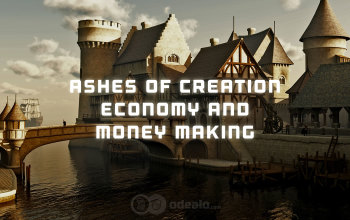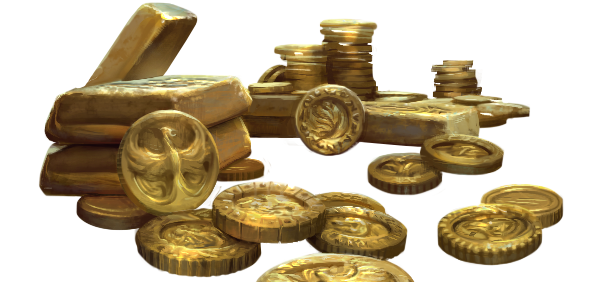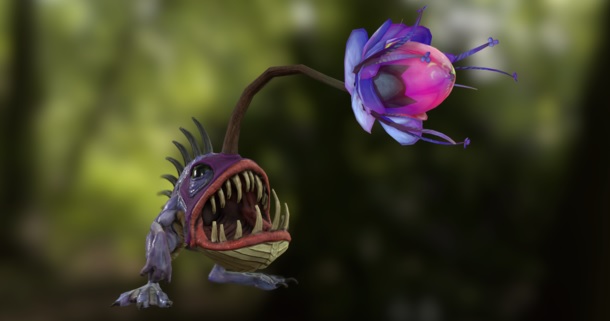
Ashes of Creation Economy and Money Making Guide
Learn about the AoC's Economy and how to earn Gold efficiently while enjoying the gameMoney Runs the World
Ashes of Creation Economy
and Money Making Guide
Introduction
There are a lot of problems associated with the creation of a balanced, fair, and stable in-game Economy System. You might think, that all you need to do is replicate systems present in the real world... this line of thinking is wrong at its very base sadly, and the reason for this is rather simple:
Players want to get rewarded for doing stuff in the game. This forces Game Developers to give them gold and/or items for completing quests, killing monsters, running through dungeons, and gathering materials. This is where the problem lays. Every time a Player gets rewarded for completing an in-game activity, the game basically creates money and hands it to him. This affects the in-game Economy exactly the same as printing money would affect the real-world Economic System. Inflation rises, gold loses value rapidly, and soon being an in-game millionaire means absolutely nothing, because a single piece of low-level gear costs billions of gold coins.
To fight this problem various money sinks are introduced to the game. These sinks are the opposite of in-game rewards - they are designed to take away the gold from the system. Of course, they create a balance problem, because Players get rather upset when the game forces them to spend most of their hard-earned money on stuff like repairs, fast travel, skills, or "special" and very expensive items that are required for crafting for example.
Now, that we have drawn the raw outlines of some MMORPG Economy aspects it is time to take a look at how the developers of the Ashes of Creation have approached this very complicated problem. In this Guide, we will cover the wide-understood Economy present in AoC, with all its important aspects, including The Artisan System (which contains Gathering, Processing, and Crafting), Trading, Markets, Caravans, and of course various in-game Money Sinks. We hope that this Guide will help you understand the important aspects of the AOC's Economy, and give you a head start in the race for becoming very rich, and very powerful figure in the Economic Node's government.

It turns out that too much money is the problem and not the solution, in MMORPGs at least...
Important Note: Please remember that Ashes of Creation is still in the development, and all information featured in this Guide is subject to change. We will do our best to keep this Guide up to date with all the information that becomes available in the future. Also, some of the information contained here is based on our interpretation of the currently available info, so keep that in mind.
AoC's Economy Basics
Before we go into detail, there are some Ashes of Creation Economy basics that we want to cover (we will go over them in much more detail in the corresponding sections). These will give you a raw picture of the AoC Economic System's shape and features:
Important Note: Many of these features are directly related to the Ashes of Creation's Node System. If you do not know how the Node System works yet, we encourage you to check it out through our detailed AoC Nodes Guide, HERE.
- Trading Hubs in different Nodes will not be connected with each other. There will be no such thing as Global Auction House. All Trade will be performed locally, within corresponding Nodes, and Node's Economic influence will expand with the rise of its Zone of Influence. This will create multiple Economic Regions.
- Marketplaces will have to be built manually by Node's Player-Governments. Players will be able to rent Stalls within those Marketplaces and establish their own Shops, sell items and provide various services to other players.
- The price of various NPC services will raise along with the rise of the Node's population. This means that prices of services in a Metropolis will be much higher than the prices of the same services in a Village for example.
- Items will feature a durability system. The money will be required to repair damaged Items. Some of the Crafting materials will be accessible only through the destruction of certain items, and enchanting an item too many times will be associated with the risk of its destruction. These are the before-mentioned money sinks.
- Players will be able to trade with each other, and the trade limitations will be rather limited. For example, Item-Binding will be an exception, and not a rule, and most of the equipable items will be tradable.
- Resources and Items cannot be sent through a Mail System. This limitation is imposed to further reinforce the Regional Economic System (this will stop players from creating Alts, moving them to various trading hubs, and transporting goods quickly through the mailbox in order to sell them in different Cities at a large and quick profit).
- There will be no Global Player Warehouses. Players will be able to store their items locally, and those items will not be accessible through Warehouses in different Nodes. This will create price differences of items between Nodes depending on their surroundings (Wood will be much cheaper in a Node surrounded by a forest and so on). This means that transporting resources between nodes will be profitable, but quite risky, as all the resources will have to be transported manually. This will also further reinforce the Regional Economic System. The transportation of goods between Nodes will be covered in much more detail in the Caravans section.
- Player-regulated Taxes will be imposed on all the Trade conducted within Nodes. Tax-money will not be accessible to Player-Governments directly, however, and will be usable for the Node's development instead (Castle nodes are an exception from this, and a Castle's Monarch will have certain freedom when it comes to spending Tax money).
- Artisan Class system will force players to specialize themselves in certain branches of Crafting, Processing, and Gathering. This will establish a player-to-player supply chain from raw materials to finished Gear and Items. Artisan Classes will be covered in much more detail in further sections of this Guide.
- Players will be able to buy Real Estates, Freeholds, and Apartments within the Nodes. The first two of those will be at a limited supply and will advance along with their Node. This means that Real Estate and Freehold trading will be a strong aspect of the in-game Economy.
With all the basics covered, it is time to take a closer look at various AoC's Economic System aspects in much more detail.
Marketplaces and Trading
Every single Marketplace in the Ashes of Creation is unique and has its own micro-economy associated with it. This means that players are sometimes forced to travel very long distances if they want to find their desired Items or Crafting Materials. The fact that different Items are in short supply in different Marketplaces creates a lot of room for making Gold out of transporting various resources.
The Marketplace Building is unlocked when a Node advances to the Stage 3 (Village) and has to be built by Node's Governing Body. Once the Marketplace is finished, Players are able to freely conduct Trade and rent special "Player Stalls" that allow them to provide enchanting and repair services, and sell their hard-earned loot to other interested Players. Marketplace's current offers can be checked in its User Interface, but the Interface doesn't let Players purchase items directly from the UI level, instead, it points them to the location of the Player Stall that has their desired item in stock.
Note: Players are immune, and cannot be attacked when they are occupying their Stall.
Economic Nodes provide their residents with additional Trade-Related perks. Marketplaces present in Stage 6 Economic Nodes (Metropolises) are connected to all other Marketplaces within their vast Zone of Influence. Economic Metropolises also offer more versatile Player Stall options. These features provide Economy-oriented Players with much freedom and wide Trade-related possibilities.
Note: Economic Metropolises will naturally become AoC's main Trading hubs, and Players from all around the Server will travel to them in order to conduct Trade, equip themselves for dangerous adventures, or sell their loot quickly.
The Caravan System
The Game World of Ashes of Creation is vast. Traveling through it takes a lot of time, and may get quite dangerous. The Fast Travel system is rather limited (on purpose, as it makes the World feel even bigger and immersive), and reserved only for Scientific Nodes and their Zones of Influence. To further increase the meaning of each of the high Stage Nodes, their specializations, and locally available resources, Players have limited Capacity and are not able to transfer goods between Nodes quickly. This is where the Caravan System comes in...
The Caravan System allows players to transport Goods between Nodes in large quantities. The transportation comes at a risk, however, as a Node Caravan is permanently flagged as a PvP Zone, and hostile Players may attempt to take it over, along with a portion of the resources that are being transported. This will force Players, who want to make a profit out of resource transportation, to group up, and protect their goods against bandit attacks. There will be two main Caravan Types:
- Personal Caravan - This Caravan type can be spawned by individual Players at any Storage Point and help them in the item transportation to any other Storage Point. The route of these Caravans is free-formed. These Caravans will help Gatherers to increase their resource-collecting efficiency, by allowing them to basically carry 100 times more resources at once. Personal Caravans will not be flagged as PvP Zones most likely.
- Node Caravans - These Caravans can be spawned in Nodes, and travel to different Nodes via one of the pre-determined routes. This means that Players who want to attack the Caravan have to watch multiple possible travel routes that the Caravan can take. As mentioned before, these Node Caravans are flagged as PvP Zones and may fall under attack, so they require constant protection. If Bandit Players manage to successfully destroy a Caravan, they are rewarded with special Certificates which can be exchanged for a portion of the goods that Caravan was transporting, in its native Node.
Note1: It is currently unclear what happens to the rest of the destroyed Caravan's Cargo, and there is no information regarding any possible shipment insurances, that would make losing a Caravan less painful.
Note2: Players who decide to defend the Caravan instead of attacking it will be rewarded in Gold when the Caravan safely reaches its destination. This will lead to some interesting PvP battles fought around Node Caravans.
The Artisan System
Ashes of Creation features elaborate Gathering, Processing, and Crafting system. Players are able to focus exclusively on Artisan work, skip Combat-related content completely, and still impact the Game world in a visible way. The Artisan System forces players to chose the profession that they want to Master, as Mastering multiple professions is not be possible. Of course, some may choose to become Jacks of all Trades, but they will not be able to Master any of their multiple trades.
Artisan Classes are divided into three main categories:
- Gathering Professions
- Processing Professions
- Crafting Professions
The combination of these Artisan Classes creates a player-to-player item supply chain (Master Gatherers are not able to utilize their collected raw materials, so they are forced to sell them to Master Crafters, and so on), that reinforces in-game economy system even further.
Note: Artisan Professions do not increase Player Statistics in any way. This means that the Profession choice depends on a Player's preference, and not on the Stats that he desires.
Now, let us take a look at each of the three main Artisan System aspects, Gathering, Processing, and Crafting:
| Gathering | |
|
Gathering revolves around the acquisition of Raw Materials that are available in the game world in various forms (Wild Life - Hides, Ore Veins - Raw Ore, Forests - Wood, Quarries - Stone, etc.). Resources available in Nodes are limited, and Gatherers have limited Cargo Capacity. Resource respawn timers are rather long. This forces Gatherers to constantly search for undepleted material sources, and increases the Market Value of raw materials. Note1: There are some ways around the limited Player-Character capacity. Players can equip special Gatherer's Bags that increase their maximum load, they can also spawn Mules (these can carry 10 times more than a Player can), and before-mentioned Personal Caravans that can carry 100 times more resources than a Player can. Note2: Gathering process requires specialized Tools, and those Tools can be made by Player-Crafters. Note3: Respawn timer of in-Node raw materials is so long, that waiting for it is not only counterproductive but most of the time pointless (unless you want to spend a few days doing nothing). Moreover, once depleted resources will not respawn in the same location, but rather in a different place within a Node. This makes Gathering a large scale venture. World of Ashes of Creation is full of dangers, and many of those dangers patiently wait for unsuspecting Gatherers... Fishermen might catch something that decides that a fisherman looks, well... like dinner, for example. Stone Golems might look exactly like Ore Veins, and creatures called Flangglers* can be easily mistaken for flowers... *Flanggler is a creature based on the Fish Species called Anglerfish. Fish of this species utilize a sort of natural fishing poles attached to their foreheads. Those poles end with a bait that is used to attract prey. Flangglers are almost exactly the same, but they live in Forests, and their bait resembles Flowers and Herbs. And they have larger teeth. And are more aggressive.
Currently, there are three fully confirmed Gathering Professions, and a few that were hinted:
|
|
| Processing | |
|
The Processing Professions revolve around refining raw materials and disassembling finished products into their components. This means that some of the materials used for crafting a piece of armor can be recovered, after the said armor have served its purpose and is no longer good enough, for example. Moreover, some of the Crafting materials can be gathered only through the disassembly of items, this fact turns Processers into vital links of the player-to-player material supply chain. The Processing itself requires some specialized equipment and infrastructure, for example smelting Metal Bars from Ore may require a Smelter or a Workstation similar to it. Currently, there is one fully confirmed Gathering Profession, but judging by already confirmed Gathering professions, and available Freehold buildings, there will be much more:
|
|
| Crafting | |
|
Crafting is the process of converting Refined Materials into finished products, which makes it the last link of the player-to-player material supply chain. All Crafting is performed at the specialized Crafting Stations. This means that high-end Crafted Gear can be made only in High Stage Nodes. Crafting Schematics and Recipes can be acquired from, for example, special Quests, dropped by Monsters, reverse-engineered (by analyzing the looted gear; this process destroys the item). Some of the Recipes might be available only in certain parts of the vast game World, which means that collecting all of them will be quite of a hassle. Note: Crafting in Ashes of Creation is not RNG-based. Currently, there are eight fully confirmed Gathering Professions, and a few that were hinted:
|
|
END NOTE Please remember that Ashes of Creation is still in development, and all information featured in this Guide is subject to change. We promise you to keep this Guide up to date with all new information that becomes available as the time passes. We hope that you have found this Guide useful and informative. If we have missed a piece of information that is important to you, please let us know! Please do note that this is an early version of our guide, and we will be happy to receive constructive criticism, that will help us improve it, so leave your suggestions in the comments section below. |
Pictures used in this article are the intellectual property of Intrepid Studios
